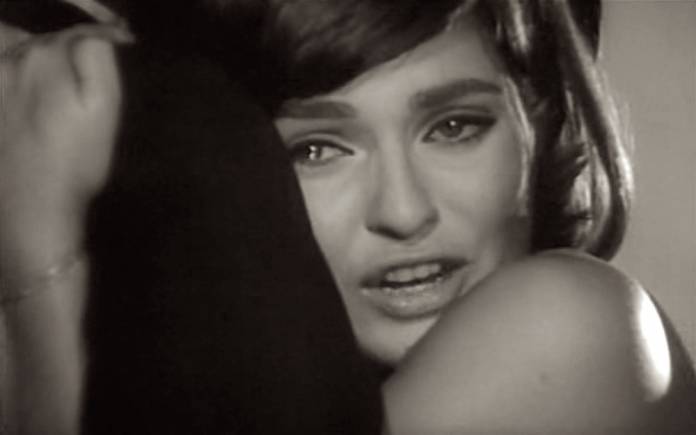SCREEN GRABS Things are changing at the Roxie (not for the first time) at the Roxie, with some fresh programming blood and the departure of a longtime favorite — Elliot Lavine, particularly famed for the recurrent noir and pre-Code series that have highlighted Roxie calendars for many years, is leaving the Bay Area for a gig in Portland at year’s end. (One hopes that won’t necessarily prevent him from the occasional guest programming slot back here.)
One thing that honors the venue’s recent past while no doubt providing an element in its future is film historian/curator Don Malcolm’s “The French Have a Name For It” series, which this week launches what’s already its third edition (playing Thu/3-November 7), with no repeats whatsoever from the prior editions.
The “it” they had a name for is, of course, film noir, whose Hollywood-heyday titles of the 1940s and 1950s weren’t given any particular handle at home (beyond a generic a like “thriller”). It was up to the French to eventually recognize the peculiar style, themes and occasional brilliance of movies whose home-turf critics, audiences, and even makers tended to think of as routine commercial product. Some of the French critics who championed them became the filmmaking stars of the Nouvelle Vague, tipping hat to noir in new classics like Godard’s Breathless and Truffaut’s Shoot the Piano Player.
But before those conscious homages, the French industry made plenty of its own post-WW2 crime melodramas, many owing a certain debt to Hollywood yet strongly stamped by a Gallic sensibility. Malcolm’s series (the latest running one extra-long weekend, Nov. 3-7) mines this rich yet under-appreciated field, which includes a great many films that were little-seen outside Europe at the time, and which have yet to experience a major critical re-evaluation. Some may well be experiencing their Bay Area debuts in the Roxie programs, 60 or 70 years late in the Roxie. As Lavine’s highly popular retrospectives played a significant role in sparking a classic American noir revival around the nation and beyond, there’s good reason to hope Malcolm’s might eventually have wider repercussions for mid-century European genre films, perhaps leading to audience demand for new restorations of long-neglected or unavailable titles.
Of the fifteen features this time around, one-third are devoted to the career of a figure memorably glimpsed in a few titles previously shown. Dark and handsome, Robert Hossein was a leading man with a slightly sad countenance and soft eyes, like a faintly more exotic Liam Neeson—he was often cast as foreigners even though he was born in Paris (son of orchestral conductor Andre, who eventually composed the scores for most of his films).
After training for the stage, his screen acting breakthrough came with Jules Dassin’s 1955 international hit Rififi, the mother of all “perfect crime” caper films. Nothing if not ambitious, Hossein was still under 30 when that same year he made his directorial debut with The Wicked Go To Hell, a perverse triangle drama in which two armed escaped cons prove no match for the seemingly guileless young woman they hold captive. The latter was played by Hossein’s first wife, stunning Marina Vlady, who also figured in his 1958 Blonde in a White Car—an outrageous concoction in which his protagonist spends the whole movie trying to figure out which of two sexy-weird sisters he had anonymous nocturnal sex with on a deserted rural road. Both features were bold, lurid highlights in earlier Roxie programs.
This time, one marathon day (Sat/5) will feature four more of Hossein’s directing efforts from the early 1960s, plus one of the many films around that time (1959’s white-slavery thriller The Road to Shame) he merely starred in. Robert Hossein — who is nearly 90 now, and was still professionally active as recently as three years ago — was in the same age range as the initial leading Nouvelle Vague lights. But he operated within the boundaries of standard commercial cinema enough to be regarded with suspicion by those trendier talents, his films not taken as seriously by critics, nor commonly distributed on the overseas arthouse circuit. Nonetheless, the Roxie movies showcased so far demonstrate an idiosyncratic sensibility often drawn to one form of narrative/stylistic experiment or another, despite basic outlines that remain in conventional thriller territory. Even when his gambits don’t entirely work, they are risky and unusual.
That well describes 1960’s The Wretches, a curious psychodrama in which a poor French family’s decrepit flat finds itself opposite the gleaming new glass-walled, ultra-moderne home of a wealthy American emigre couple (Hossein, Michele Morgan), whose decadent martial miseries are thus on display for all to see. Fascinated by their surface glamour, young Louise (Perrettte Pradier, whose wooden performance is a problem here) crosses the street to beg a job as live-in housemaid, inevitably getting sucked into the newcomers’ mutual self-destruction. A pretentious but intriguingly odd warmup for such improved variations on similar themes as The Servant, not to mention Who’s Afraid of Virginia Woolf?, The Wretches’ heightened mix of voyeurism and theatricality makes a distinctive impression.
Likewise Hossein’s next exercise behind (as well as in front of) the camera, 1961’s The Game of Truth, is another artificial yet striking treatment of that favorite theme at the era: The foibles of the amoral bourgeoise. When one particularly detested guest is found murdered right in the middle of a famous author’s house party, everyone is a suspect, and needless to say all sorts of ugly secrets come tumbling out before we find out whodunnit. (One key figure is played by future star Jean-Louis Trintignant.) There’s something too schematic about the clever script and camera contrivances that keep this Agatha Christie-like mystery talkfest hyperactive while confined to one room. Still, you can feel the director relishing the formal challenges he’s set for himself — and he’s all mysterioso charisma in the role of a game-changing latecomer who arrives halfway through.
Two slightly later films are more successful. The most sensational is 1965’s The Secret Killer or The Vampire of Dusseldorf—the latter being the public nickname of a notorious real-life serial murderer in Germany between the wars. While its script plays fast and loose with the actual facts of the case, Hossein strikingly casts himself against type as a seemingly passive, nebbishy, almost comical figure who nonetheless applies himself to slaying the opposite sex with harrowing, remorseless zeal. The actor-director-coscenarist’s then-paramour, Marie-France Pisier, plays a Dietrich-like cabaret star the titular figure is infatuated enough with to stalk without killing — for a while, at least.
But the gem of the lot is the prior year’s Death of a Killer, in which Hossein returns from a five-year prison sentence to find the sister (Pisier again) he loved “perhaps too much” has flown their mother’s coop. Worse, she’s cohabiting somewhere with the ex-best friend he suspects of having betrayed him to the cops. Frankly driven by incestuous desire and jealousy, this “B” crime melodrama begins casually, almost amateurishly, with silent home-movie-like flashbacks and voiceover narration. But gradually its scale expands, with some bizarre, hyperbolic setpieces en route to a terrific climax (as mob justice plays out in an empty sports stadium) and arresting, desolate coda.
Hossein remained a significant figure in French cinema (and television), moving toward primarily supporting character roles as he grew older. After the Russian history lesson of 1967’s Rasputin and a rather good spaghetti western, 1969’s Cemetery Without Crosses, his directing career slowed down, though he still had the clout to mount an epic Les Miserables in 1982 — one of the better regarded adaptations of that famous novel, though not among the more widely seen internationally. His value in French cinema is sure to be reappraised in decades to come. Certainly after Saturday he’ll have a lot of new San Francisco fans, most of whom probably had no idea who he was beforehand.
There are, of course, also 10 non-Hossein features as well in this Roxie series, this time reaching as far back as the officially “proto-noir” era of the late 1930s. The five-day program kicks off with both the earliest and by far most famous title, Marcel Carne’s 1937 Le jour se leve aka Daybreak, with the great Jean Gabin in his full early glory as a luckless crime-of-passion perp who’s barricaded himself indoors in a doomed stand against police.
The next night brings another knockout star vehicle, Christian-Jacque’s 1946 Un revenant (A Lover’s Return), in which Louis Jouvet is a now-prosperous man who comes back to avenge himself on the rich, horrible family that grievously wronged him two decades earlier. Less a noir than a precision-cut black comedy, it is well worth discovering. The same director, a staple in the French commercial mainstream for decades, also offers up the impressive 1943 Journey Without Hope, a beautifully atmospheric noir in which Cocteau’s favorite Jean Marais is unusually animated as a besotted traveler who tries to save a damsel (Simone Renant) from the gangster ex-boyfriend source of her distress (Paul Bernard).
Other highlights include Henri Decoin’s ironically named 1947 Not Guilty, with Michel Simon as a disgraced small-town doctor whose petty grudges acquire a Trump-like antiheroic grandeur (and a taste for murder); the obscure 1962 Dark Journey, in which normally suave Louis Jourdan plays a more pathetic, neurotic sort of sore loser edging toward violent madness; and same year’s Le Denonciation, a coolly intellectual, ethically questioning thriller in which a witnessed death in the present day re-awakens Maurice Ronet’s discomfiting memories of confession under Nazi torture.
The series ends on Monday with two features from Jean Delannoy, who really did suffer somewhat from postwar accusations of excessive cooperation with the Axis occupiers. (Still, his career lasted until the mid-1990s, and died eight years ago at the ripe age of 100.) Unavailable for preview but apparently quite dashing in a Casablanca-sorta-way is 1942’s Macao, L’enfer du jeu aka Gambling Hell, an exotic adventure shot in 1939 but unreleased (with changes to please the Germans) till 1942, featuring such duly “exotic” performers as Sessue Hayakawa and the inimitable Erich von Stroheim.
Then there’s the bizarre 1947 The Chips Are Down, written by no less than Jean-Paul Sartre. Perhaps unsurprisingly, this bizarre fantasy’s final anti-romantic message rings more true than the romance that floats most of it, as a Resistance fighter (Marcello Pagliero) and a collaborator’s wealthy wife (Micheline Presle) are returned to life after their premature deaths—the authorities having decided that due to a clerical error they should have met as soulmates while still living. But class and political differences, as well as various other intrigues, make even true love harder to sustain in the mortal world. It’s an ingenious piece, but the expressions of stock sentimentality are a lot harder to swallow than the framework of existential malaise that surround them.
“The French Have a Name For It 3” plays Thurs/3-Mon/7, Roxie Theatre, SF. $12 (double bill) to $50 (complete series pass). www.roxie.com






